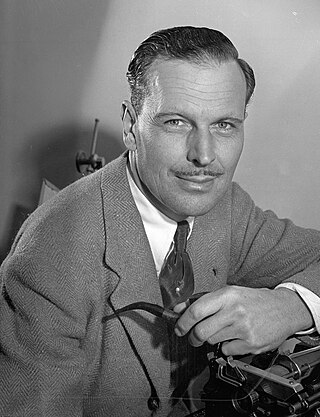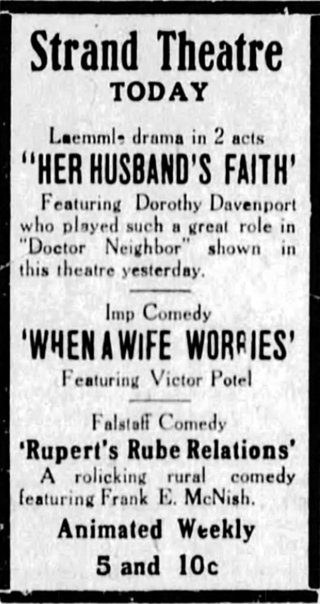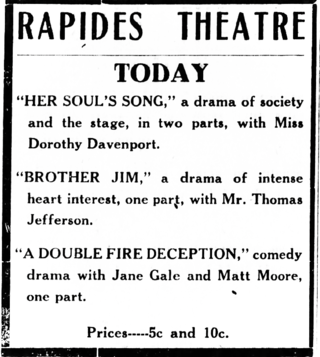
John Winthrop Noble was an American film director and screenwriter during the silent era.

Film Booking Offices of America (FBO), registered as FBO Pictures Corp., was an American film studio of the silent era, a midsize producer and distributor of mostly low-budget films. The business began in 1918 as Robertson-Cole, an Anglo-American import-export company. Robertson-Cole began distributing films in the United States that December and opened a Los Angeles production facility in 1920. Late that year, R-C entered into a working relationship with East Coast financier Joseph P. Kennedy. A business reorganization in 1922 led to its assumption of the FBO name, first for all its distribution operations and ultimately for its own productions as well. Through Kennedy, the studio contracted with Western leading man Fred Thomson, who grew by 1925 into one of Hollywood's most popular stars. Thomson was just one of several silent screen cowboys with whom FBO became identified.

Even as Eve is a 1920 American silent drama film by A. H. Fischer Features and distributed by Associated First National Pictures. Produced by B. A. Rolfe, the film was directed by Rolfe and Chester De Vonde, with Arthur A. Cadwell and Conrad Wells as cinematographers. It was filmed at the former Thanhouser Company studios in New Rochelle, New York. Some exterior scenes were filmed in the New York Adirondack Mountains and on a Long Island estate. It was based on the short story "The Shining Band" by Robert W. Chambers, and adapted by Charles Logue.

Alfred Emory Johnson was an American actor, director, producer, and writer. As a teenager, he started acting in silent films. Early in his career, Carl Laemmle chose Emory to become a Universal Studio leading man. He also became part of one of the early Hollywood celebrity marriages when he wed Ella Hall.

Edgar Jones was an American actor, producer, writer, and director of silent films. He starred in and directed the film adaptation of The Gold in the Crock. He also starred in and directed Siegmund Lubin films including Fitzhugh's Ride. He established a film production business in Augusta, Maine that produced original stories and adaptations of Holman Day novels.

Barry O'Neil was a film director and writer. His real name was Thomas J. McCarthy. He directed several Thanhouser films including the production company's first two-reeler, Romeo and Juliet. He went on to work for Lubin and then World Film Corporation.

Barriers of Society is a 1916 American silent drama film directed by Lloyd B. Carleton. Universal based the film on the story written by Clarke Irvine and adapted for the screen by Fred Myton. Dorothy Davenport and Emory Johnson, lead an all-star cast of Universal contract players in this feature film.

Doctor Neighbor is a 1916 American silent feature film black and white melodrama. The film was directed by Lloyd B. Carleton. It stars Hobart Bosworth and pairs Dorothy Davenport and Emory Johnson in leading roles.
Gilbert P. Hamilton was an American film company executive and director. He worked at Essanay as a cinematographer, headed the St. Louis Motion Picture Company, and then launched the Albuquerque Film Manufacturing Company.
Maie B. Havey, born Marie Judge, was an American screenwriter active during the earliest years of Hollywood. During her decade in the industry, she is credited with 70 screenplays.
Ralph Kellard was an actor in the U.S. who appeared in theatrical productions and films. His film work included leading roles in several films such as The Shielding Shadow (1916), The Restless Sex (1920) and The Cost (film). His son Robert Kellard also became an actor. His other son, Thomas Kellard was also an actor and then became a Vice President at Lockheed Shipbuilding and Construction in Seattle, Washington. Ralph's grandson's from Thomas, Phil and Rick Kellard, are both television writers and producers. His great grandson, Matthew Kellard is a screenwriter.

Her Husband's Faith is a 1916 American silent short film directed by Lloyd B. Carleton. The film is based on a story by Paul Machette. Eugene De Rue developed the screenplay. This domestic society drama's features Dorothy Davenport, T. D. Crittenden and Emory Johnson.

Heartaches is a 1916 American silent short film directed by Lloyd B. Carleton. The film is based on a story by Grant Carpenter. This drama's features Dorothy Davenport, Alfred Allen, and Emory Johnson.

Two Mothers is a 1916 American silent short film directed by Lloyd B. Carleton. The film is based on a story by I.A.R. Wylie. Calder Johnstone developed the adaptation for the screen. The drama's features Dorothy Davenport, Alfred Allen and Emory Johnson.

The Unattainable is a 1916 American Black and White silent drama directed by Lloyd B. Carleton. The film is based on the story by Elwood D. Henning. The photoplay stars Dorothy Davenport and Emory Johnson.

Her Soul's Song is a 1916 American silent short film directed by Lloyd B. Carleton. The film is based on a story by Betty Schade. Calder Johnstone developed the screenplay. This drama's features Dorothy Davenport and Emory Johnson.

The Human Gamble was a 1916 American silent Short film directed by Lloyd B. Carleton. The film is based on the story and screen adaptation by Calder Johnstone. The drama stars Dorothy Davenport, Emory Johnson, and a cast of Universal contract players.
Gayety Comedies are a comedy film series released made in the United States during the silent film era. They debuted in 1919 and were distributed to various film exchanges Al Christie produced them. The studio that made them was owned by E. H. Emmick and J. L. Friedman and was on the corner of Sunset Boulevard and Gower Street.

Joe Martin the orangutan was a film star of the 1910s and 1920s.

Louise Emerald Bates was an American actress whose photo was covered in the 1915 issue of Motion Picture Classic. Born in Massachusetts, U.S, she left the stage and theater productions, where she starred in musical comedies, for Thanhouser's Falstaff comedies produced at its New Rochelle studio. She was a female lead in Falstaff comedies. In 1916 she worked at Thanhouser's studio in Jacksonville, Florida. where the Falstaff crew relocated. In 1916, actor Harris Gordon was noted as her husband. She married Edmund Mortimer and became Louise Bates Mortimer.















